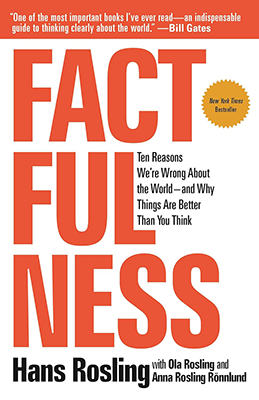
Factfulness
Factfulness
“Factfulness: Ten Reasons We’re Wrong About the World—and Why Things Are Better Than You Think” by Hans Rosling, along with co-authors Anna Rosling Rönnlund and Ola Rosling, challenges commonly held misconceptions about global trends and statistics. The book emphasizes the importance of understanding the world based on data rather than assumptions or outdated perceptions. Here’s a summary of the key themes and concepts:
Key Themes
The Gap Instinct:
People often divide the world into two groups (developed vs. developing), leading to a skewed understanding of global progress. Rosling argues that the reality is more nuanced, with a continuum of income and living conditions. The gap instinct misleads us into thinking the world is more divided than it truly is.
The Negativity Instinct:
The media often highlights negative news, which can lead to a perception that the world is getting worse. Rosling counters this by presenting data showing that many aspects of life, such as health and education, have improved over time.
The Straight-Line Instinct:
Many people assume that trends will continue in a straight line, without considering changes that can alter these trajectories. Rosling illustrates this with examples like population growth and economic development, which are often more complex.
The Fear Instinct:
Fear can distort our perception of risks. Rosling highlights that while certain events (like terrorism) receive intense media coverage, they are statistically rare. Understanding actual risks allows for more rational decision-making.
The Size Instinct:
Misinterpreting data can arise from not considering the context or scale of an issue. Rosling emphasizes the importance of comparing numbers appropriately and being wary of anecdotal evidence that can misrepresent the reality.
The Generalization Instinct:
Stereotyping people or regions can lead to misconceptions. Rosling encourages recognizing diversity within groups and understanding that trends can vary significantly across different contexts.
The Destiny Instinct:
The belief that certain cultures or countries are destined to fail or succeed is challenged. Rosling argues that change is possible and that societal progress is influenced by numerous factors.
The Single Perspective Instinct:
Relying on one viewpoint can limit understanding. Rosling advocates for interdisciplinary approaches, combining insights from various fields to form a more comprehensive understanding of issues.
The Blame Instinct:
Seeking someone to blame for problems can oversimplify complex situations. Rosling suggests focusing on solutions rather than assigning blame, which can foster a more constructive dialogue.
The Urgency Instinct:
The feeling of urgency can lead to rash decisions. Rosling advises taking a step back and analyzing data carefully before reacting, emphasizing the need for measured responses to global challenges.
Notable Examples
– Global Health: Rosling presents data showing significant improvements in health indicators, such as life expectancy and child mortality rates, particularly in low-income countries.
– Education: He illustrates how educational access has expanded globally, leading to higher literacy rates and improved gender equality.
– Economic Growth: The book highlights that many developing countries are experiencing rapid economic growth and improving living standards.
Conclusion
“Factfulness” advocates for a more fact-based worldview, encouraging readers to question their assumptions and rely on data to understand global trends. Rosling’s message is one of hope: despite challenges, the world is making progress in many areas, and a more informed perspective can lead to better decision-making and a greater understanding of our shared humanity.
By embracing a fact-based approach, individuals can combat misconceptions and contribute to a more accurate narrative about the state of the world. Rosling ultimately seeks to inspire a more optimistic and informed perspective, urging readers to appreciate the complexities of global development and the progress that has been made.
